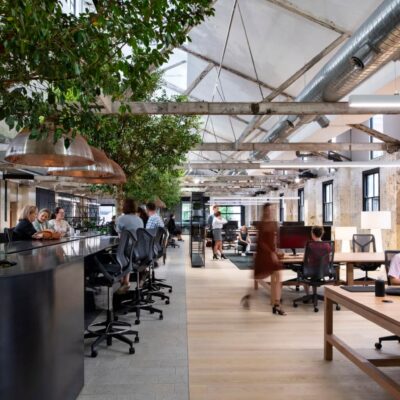Whether you’re looking for the best desk booking software for your office or a hot desk reservation system for a coworking space, you’re spoilt for choice. There are more than 50 tools to consider, and it’s not necessarily a good thing when trying to pick just one.
Now, I might be a bit biased, but since our team at Archie has extensive experience with desk booking solutions, I’ve decided to tap into our insights and expertise to give you an objective overview of the best desk booking software options available.
💡 TL;DR: What’s the best desk booking software? With flexible pricing based on the number of resources, not users, and high ratings on G2 and Capterra, Archie stands out as the top pick for desk booking (and more). Here’s why.
Guide to the best desk booking software
What is desk booking software?
Desk booking software (also called a desk reservation system, desk sharing tool, shared desk software, hot desk app, or even desk hoteling software) makes it easy to reserve and manage desks, be it in advance or on demand, helping you make the best use of your office space.
How does desk booking software work?
- As an employee, you just open a desk booking app or website and pick an available workspace. You can choose a specific desk type, like a sit-stand desk, a quiet hot desk, or a collaboration spot in your team’s workspace or zone. You can then book ahead for just a few hours or the whole day using time slots like 9–12 or 1–5. Some systems let you set recurring bookings if you come in on the same days each week, so you don’t have to keep reserving the same desk again and again.
- As an admin or manager, you can do a bit more. For example, set rules for how far in advance desks can be booked, policies like maximum duration, lead time, and cancellation limits, who can use certain areas, and what happens if someone doesn’t show up. You can also book desks for your team, which is handy for team days or meetings.
Behind the scenes, desk booking software makes sure everything runs smoothly. It updates desk availability right away to avoid double bookings, but it also helps you see how your office is being used. Since it keeps a usage log, you can track desk occupancy rates, understand booking frequency, and spot desks that rarely get used.
Best desk booking software — shortlist
- Archie: Best desk booking software for growing hybrid teams
- Envoy: Best for secure visitor & office management
- Robin: Best for resource booking with limited visitor management capabilities
- elia: Best for straightforward desk management
- OfficeSpace: Best for resource booking on a higher budget
- Officely: Best for booking desks exclusively via team communication apps
- Skedda: Best for custom booking workflows.
- Deskbird: Best for affordable resource booking
- Kadence: Best for helpful and responsive support
- Eden: Best for onboarding hybrid employees
- Tactic: Best for managing hybrid team schedules
How we chose the best desk booking tools
To find the best desk booking software, we looked at user reviews on sites like G2 and Capterra, along with details from the products themselves. We scored each tool based on a few key things:
- Ease of use (20%) – How simple and user-friendly the desk booking system is, based on what real users had to say and how the platform looks and feels.
- Features (25%) – What the software can do (workspace booking, visitor check-in, and office usage reports, just to name a few), and how well those features work.
- Pricing & value (20%) – Whether the desk booking tool gives you good value for your money, including how it’s priced (per user vs. per desk).
- Flexibility (15%) – How well it can grow with your team or adapt to changing office needs.
- Customer support (20%) – How helpful and responsive the support team is, and how reliable the desk booking software is overall.
Key features to look for in desk booking software
Apart from multiple desk booking options (duh), the best desk booking software has a lot to offer:
Easy desk reservations
Employees should be able to book desks in just a few clicks, whether they’re using a phone, a computer, or even their calendar. A good desk booking system shows which desks are free in real time and lets users choose from a map or a list. They can filter by location, date, or what they need (like a quiet corner or a standing desk). Bookings update instantly, so there are no double bookings, and everything stays synced with work calendars like Google or Outlook.
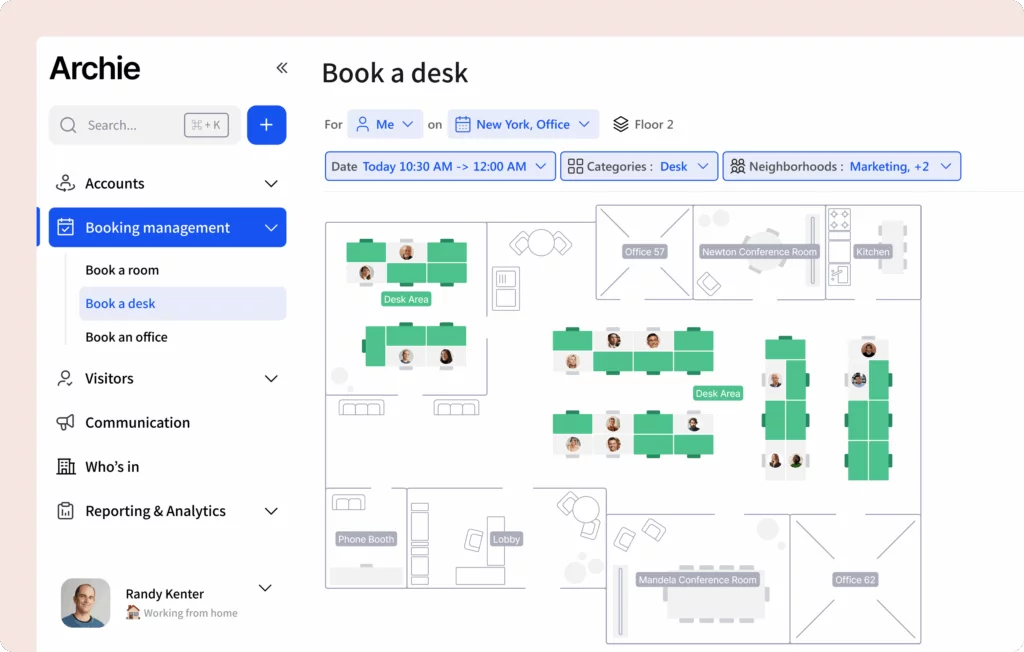
Recurring desk bookings and rules
If someone comes into the office on the same days every week, they can set up a recurring booking — no need to reserve the same desk over and over. Admins can also set rules, like how far in advance desks can be booked, who can book certain areas, and what happens if someone doesn’t show up. Some desk booking systems even release desks automatically if no one checks in.
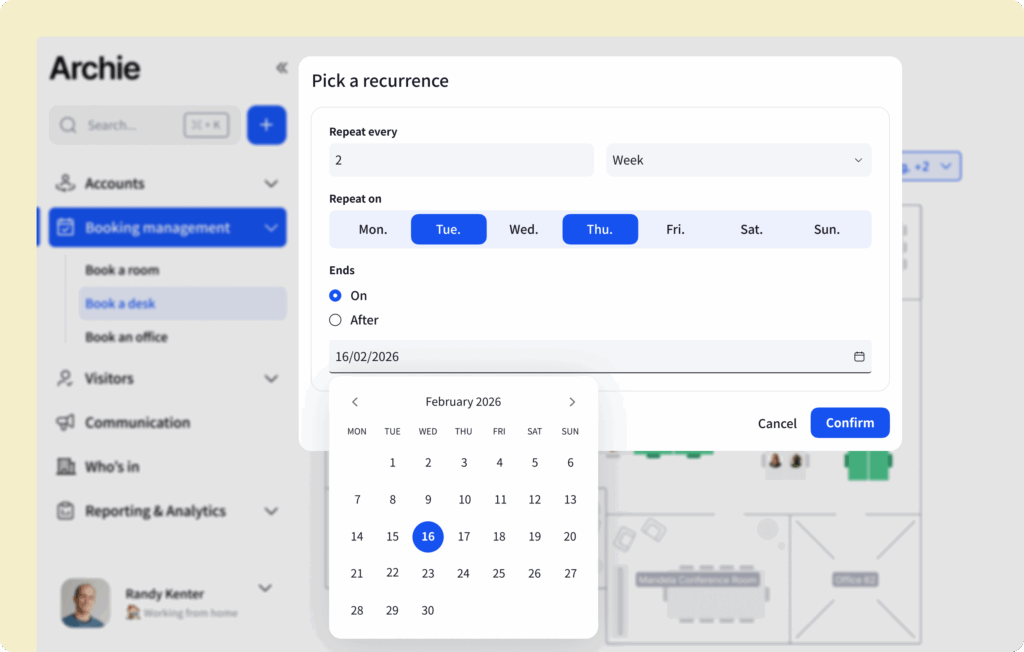
Finding colleagues and employees easily
Many desk booking systems include a “people finder” so employees can see who’s in the office and where they’re sitting, so that they can book the workspace next to their colleagues. Some tools even send alerts when teammates plan to come in. As an admin, you can also check who’s in the office at all times.

Reporting and office analytics
Desk booking tools often come with occupancy reports that show how desks are being used. This helps you figure out which workspaces are the most popular, what days are busiest, and which desks aren’t being used as much. You can also export the workplace data for sharing or record-keeping.
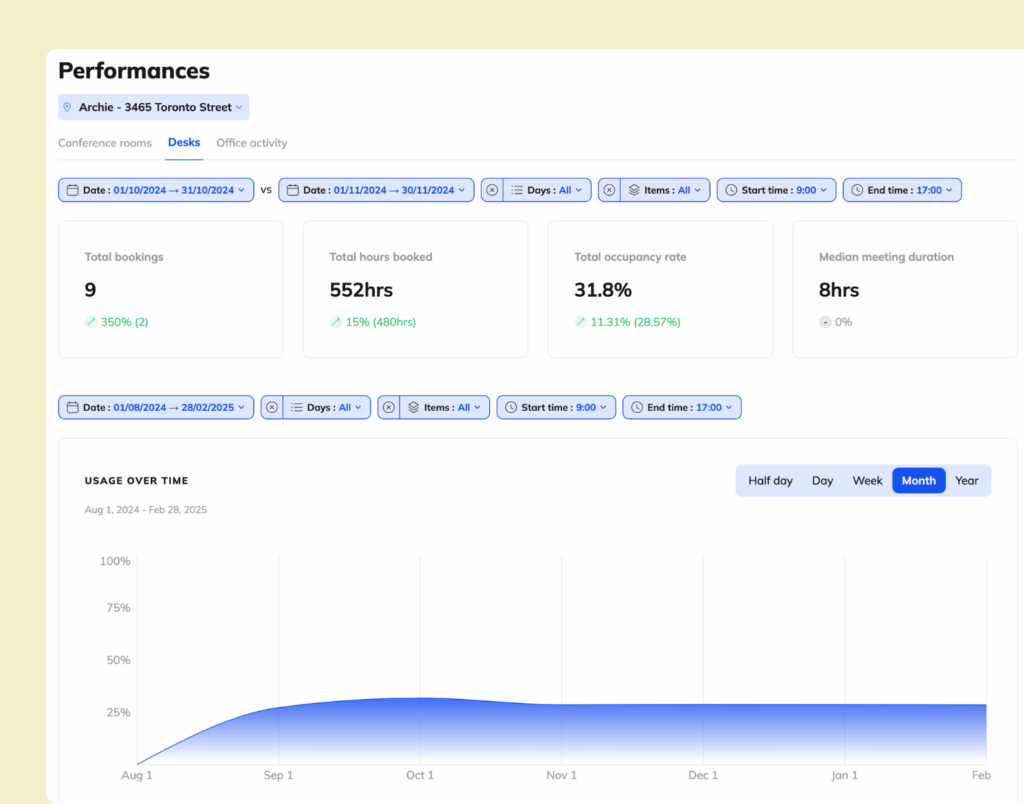
Third-party integrations
Look for desk booking software that works with the tools your team already knows, like Google Calendar, Slack, Microsoft Teams, or Outlook. These integrations make it easier to book desks without switching between apps. Also, features like Single Sign-On (SSO) make logging in fast and secure for your team.
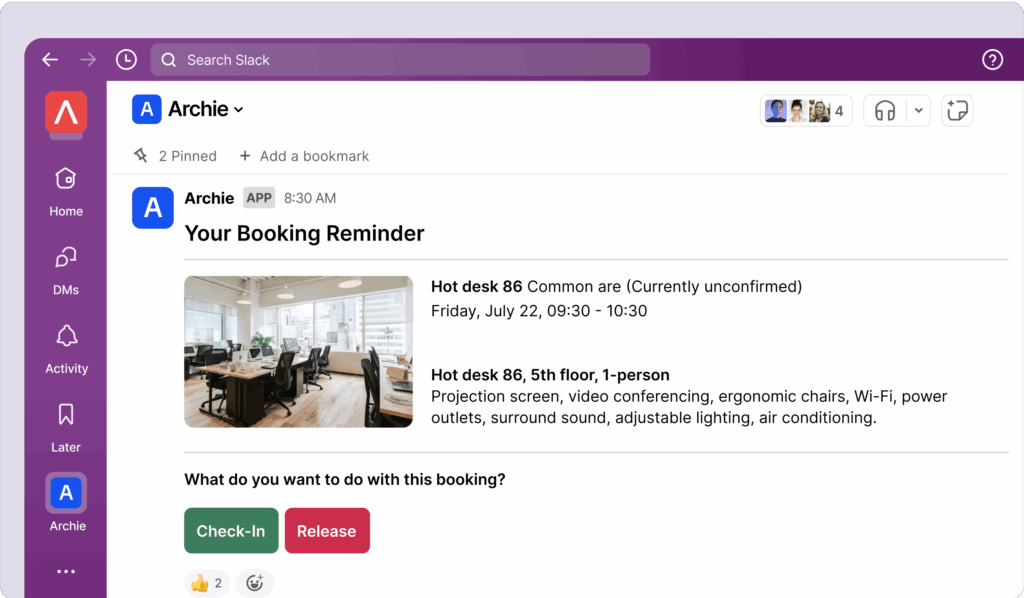
Pricing models offered by desk booking systems
Before you start comparing desk management software features, though, take a moment to understand the two most common pricing models.
Some platforms charge per user and others charge per resource — in this case, desks (or meeting rooms) — which can save money for larger companies with more employees than desks. Pay attention to the pricing plans, as some of the basic ones seem affordable but don’t actually include desk booking features.
No matter the exact pricing model, go for platforms with transparent pricing, no hidden fees, and the flexibility to grow with your business. But we’ll get to that later.
For now, here’s an exemplary pricing comparison for 100 desks and 200 employees, charged per month in US dollars:
💰Archie from $280 ($2.80 per desk)
💰Officely from $500 ($2.50 per user per month, desk booking through Slack/Teams)
💰Kadence from $800 ($4 per active user per month)
💰Envoy from $1000 ($5 per active user per month when billed annually)
Best desk booking software compared
#1 Archie
Archie is an all-in-one workspace management platform designed to simplify desk booking, room reservations, and visitor management for your team. What sets Archie apart is its cost-effectiveness — it charges per resource instead of per user, which is great for companies with hybrid work setups and fluctuating in-office attendance. Plus, its user-friendly and highly customizable interface makes it easy for teams to adopt.
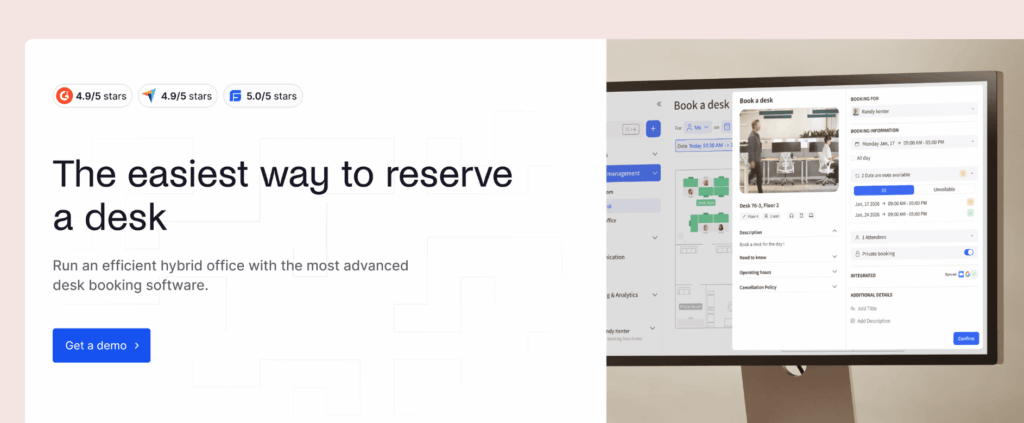
🔑 Key features
- Desk and room booking: Archie makes booking desks and meeting rooms quick and easy, allowing teams to coordinate schedules and better use office space. You can also assign dedicated and permanent desks to employees who need them.
- Interactive floor plans: The desk booking software includes interactive office maps for easy desk and room booking, making the process as simple as clicking a spot on the map.
- Mobile access: The mobile desk booking app lets your employees book desks, view floor plans, and manage reservations from their phones. If needed, the app (that you can download for free from an App Store & Google Play) can be fully branded for an extra charge.
- Neighborhood zoning: Archie supports ‘neighborhoods’ — dedicated office zones that group teams together.
- Employee lookup: Archie helps your team find out where their coworkers are sitting or if they’re at work that day.
- Employee check-ins: Depending on your hybrid work policy, employees can check in via the app, scan a QR code, or use physical check-ins.
- Workspace analytics: Archie offers detailed reports on how desks and rooms are used, helping you optimize layouts and reduce wasted space.
🔎 Pros & cons
➕ User experience: Archie offers a great user experience — the interface is simple, and the learning curve is minimal, which helps users get started quickly. One of the standout features of Archie is its customer service, which is available 24/7 and is known for being quick and helpful. This has earned Archie high ratings on review sites like G2, where it’s considered one of the best desk booking software solutions.
➕ Cost-effectiveness: In terms of cost, Archie is quite affordable, especially for growing hybrid teams. Unlike other software that charges based on the number of users, Archie’s pricing plans are based on the number of resources (like desks and meeting rooms). This makes it a great option for teams that need flexibility as they grow, without breaking the budget.
➖ Not the best choice for smaller offices and teams: However, Archie may not be the best fit for smaller offices and teams. The Starter plan is designed for larger, hybrid teams with more users than desks and includes just one location and 25 active resources. While this setup works well for growing teams, it might not be ideal for smaller offices. The more resources and users you add, the better the pricing, which isn’t always the case with some other desk sharing tools.
💳 Pricing
The Starter plan starts at $2.8 per desk per month (minimum $159/month). The visitor management module is charged separately. A free trial is available.
#2 Envoy
Envoy is a strong desk management software that simplifies office tasks, focusing on security, efficiency, and flexibility. It’s perfect for companies wanting to improve hybrid work setups while ensuring workplace safety remains a top priority.
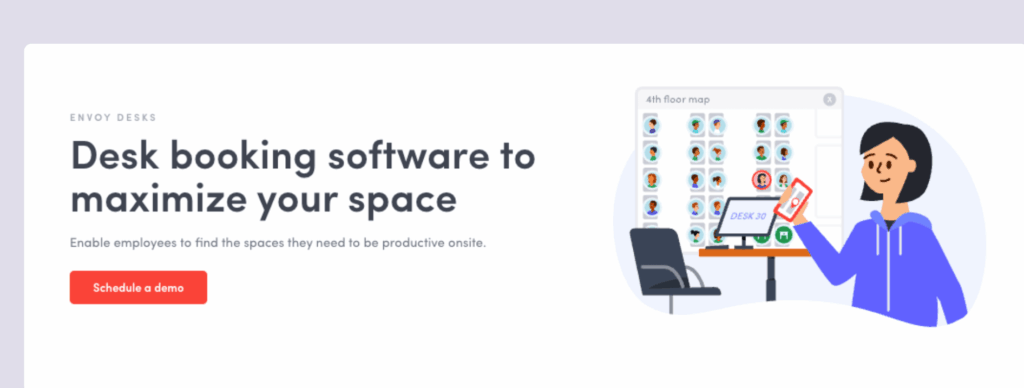
🔑 Key features
- Desk and room booking: Your employees can easily reserve desks and meeting rooms on the go, ensuring they have a spot when needed.
- Delivery management: Envoy helps track incoming deliveries by notifying employees when packages arrive and keeping records to prevent lost items.
- Workplace safety and compliance: The platform includes features for visitor screenings, managing capacity limits, and responding to emergencies.
- Analytics and reporting: Envoy provides clear insights into how office spaces are used.
- Integrated workplace experience: Envoy’s desk booking system integrates with tools like Slack, Microsoft 365, and Google Workspace.
🔎 Pros & cons
➕ Office security features: Envoy prioritizes office security with features like touchless check-ins and visitor screenings, creating a safer and more seamless guest experience for both employees and visitors.
➕ Comprehensive analytics: The platform provides valuable insights into office space usage and resource management, helping you make informed decisions on how to optimize the workspaces and improve overall efficiency.
➖ Per-user pricing model: However, a downside of Envoy is its per-user pricing model. It can become costly for larger organizations, especially if office attendance fluctuates.
💳 Pricing
The standard desk booking plan starts at $5 per active user/month when billed annually. Visitor management is billed separately.
#3 Robin
Robin originally launched as a room booking tool, but over time, it has grown into a full platform where people can reserve desks and meeting rooms, see who plans to be in the office, manage visitors, and monitor how space is used. It is mostly aimed at larger companies, often with 500 or more employees and several office locations.
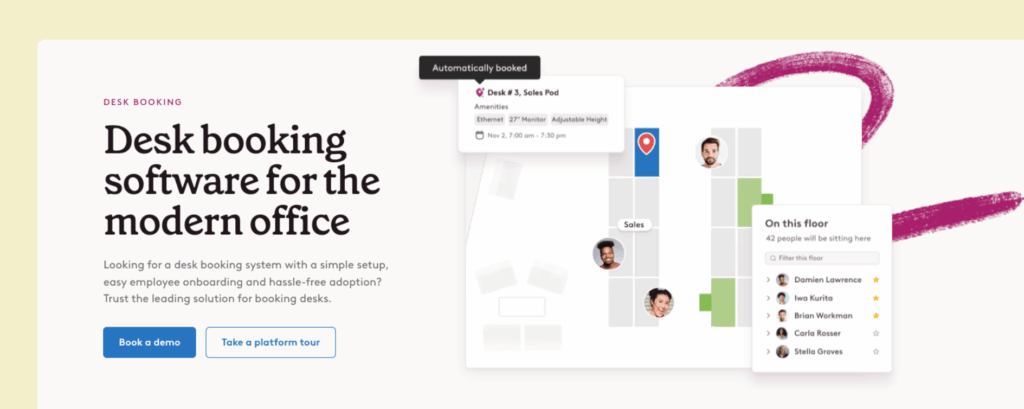
🔑 Key features
- Assigned desk sharing: You can assign one desk to multiple employees based on their schedules, which helps you optimize space usage.
- AI-assisted desk booking: Robin uses past booking data and employee preferences to automatically pick and reserve the best desk for your team members.
- Interactive office maps: Robin provides real-time, interactive maps of the office layout so your employees can easily find available desks.
- Employee check-ins: Your team can choose from various check-in options, including QR codes, access control integrations, and automatic WiFi check-in.
- Advanced analytics: Robin provides insights into how your office space is used, helping you identify peak usage times and improve layouts to match employee needs.
🔎 Pros & cons
➕ Wide feature set for larger offices: Robin combines desk and room booking, visitor management, wayfinding, and other workplace tools in a single system. This makes it attractive for bigger, multi-site companies that want everything under one roof.
➕ Good experience for employees: Many reviewers say Robin is straightforward to use on both desktop and mobile. Automatic check-ins based on mobile, network, or sensor data can save employees from a lot of extra clicks.
➖ Enterprise-level, quote-based pricing: Pricing is custom and user-based, so growing teams or drop-in users can push costs up fast. Companies that mainly want simple desk booking or need to keep spending under control might want to consider Robin alternatives.
💳 Pricing
Since Robin does not publish exact prices online, you need to contact their team for a custom quote. They do offer a 14-day free trial, which gives you time to test the platform and its key features before you commit.
#4 elia
elia makes it easy to manage office spaces by allowing employees to book desks, find colleagues, and use office space more efficiently, all in real-time. It’s a great choice for companies looking for a simple, user-friendly desk booking tool that doesn’t need to connect with lots of third-party apps.
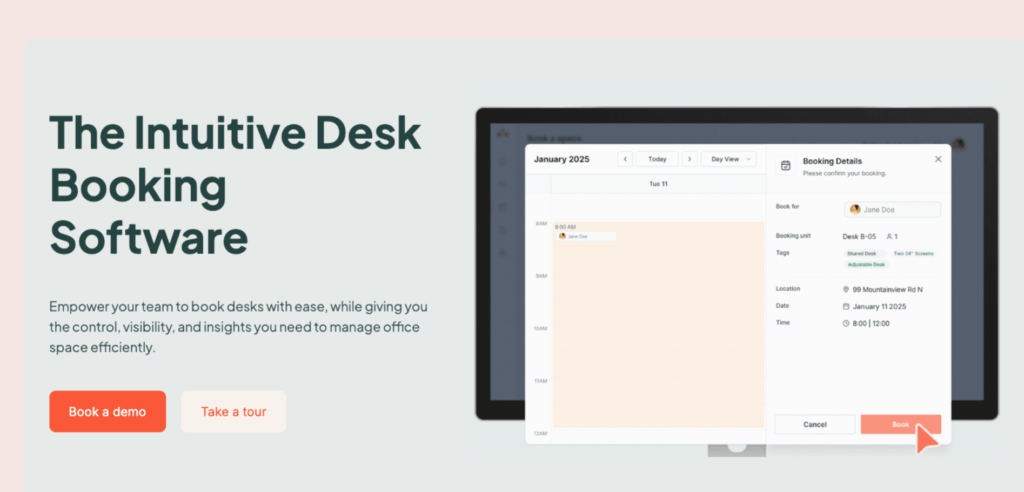
🔑 Key features
- Interactive floor plans: Employees can easily reserve desks by browsing an interactive office map, using filters to find the best available space.
- Groups and neighborhoods: You can assign specific areas to teams and control access to certain spaces while customizing booking rules to match your office needs.
- Third-party desk bookings & invitations: Employees can book desks for others or invite colleagues to the office.
- Desk usage analytics: elia gives clear insights into how desks are being used, helping you optimize the office layout and avoid wasting space.
🔎 Pros & cons
➕ Fast setup: elia can be set up quickly without heavy IT involvement, which makes it a great choice for companies looking for fast implementation.
➕ Easy to use: The platform is easy to use — employees can start booking desks right away without needing any training.
➖ Limited third-party integrations: While elia supports the most essential integrations, it doesn’t connect with as many third-party tools as some other enterprise-focused platforms. If you rely on specific tools for your business, you might find that elia doesn’t have the integration options you need.
💳 Pricing
The Standard Plan starts at $99 per month and is ideal for businesses looking for basic workplace management features with up to 100 users and 100 spaces.
#5 OfficeSpace
OfficeSpace is a hybrid workspace management platform known for its strong set of features, especially for desk and room booking. It offers plenty of tools for organizing office layouts and managing reservations. However, it’s more suitable for companies willing to pay for premium features since it tends to be expensive.
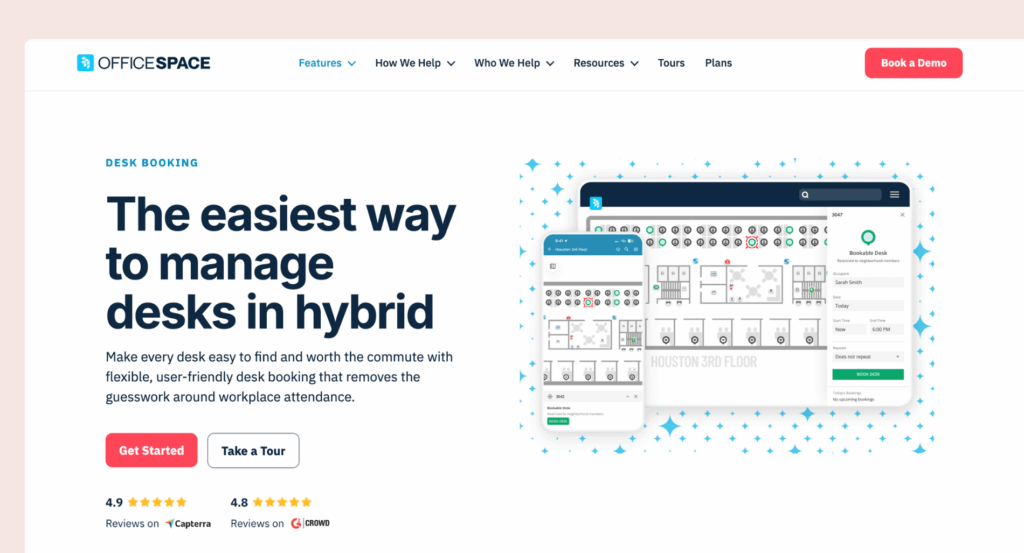
🔑 Key features
- Seat assignments: OfficeSpace lets you assign permanent desks to employees who need them while using other desks for hot desking and office hoteling.
- Conference room scheduling: You can easily book meeting rooms to help teams plan collaborative sessions without scheduling conflicts.
- Visitor management: The platform includes a check-in system to improve workplace security, though it’s a separate module and may not integrate as smoothly as with some other desk booking solutions.
- Deliveries management: OfficeSpace helps you efficiently handle incoming packages by notifying employees when their deliveries arrive and keeping delivery records.
- Analytics & reporting: The desk booking software provides detailed reports on how desks, meeting rooms, and other spaces are used, helping you optimize your office layout.
🔎 Pros & cons
➕ Comprehensive desk booking tools: OfficeSpace excels in providing desk booking options, making it easy to manage hybrid workspaces.
➕ Extensive space management features: It offers much more than just basic booking, with tools for space planning, move management, and detailed reporting.
➖ High implementation costs: OfficeSpace has a high setup fee and a per-user pricing model, which can get expensive for larger teams that are usually looking at OfficeSpace alternatives, too.
💳 Pricing
For the latest pricing details, contacting OfficeSpace directly is best since they don’t list prices on their website.
#6 Officely
Officely is an easy-to-use desk booking tool that works directly within popular communication platforms — Slack and Microsoft Teams. By embedding its features into these tools, Officely makes it simple for employees to book desks, meeting rooms, and other office resources without leaving the apps they already use.
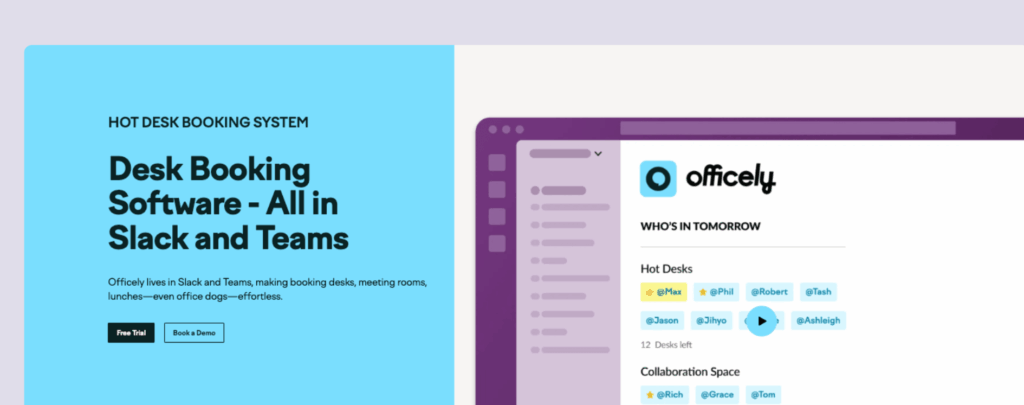
🔑 Key features
- Desk and room booking: Your employees can easily book desks, meeting rooms, and resources directly from Slack or Teams.
- Comprehensive resource management: Officely also supports booking parking spaces, bike racks, and pet-friendly spots.
- Office visibility: The desk sharing app provides real-time insights into who will be in the office on a given day.
- Announcements and social planning: Officely makes organizing office events, lunches, and team gatherings easy.
- Space utilization analytics: You can get more insights into attendance and space usage to help you optimize office layouts.
🔎 Pros & cons
➕ Seamless integration with communication apps: Officely offers seamless integration with communication apps like Slack and Teams, which reduces the need for additional software and helps streamline desk bookings and other tasks within platforms your team is already using.
➕ User-friendly interface: The user-friendly interface is another major plus. The platform is intuitive and easy to navigate, allowing employees to quickly make desk bookings and access other features without any hassle.
➖ Dependency on Slack/Teams: However, a downside of Officely is its dependency on Slack or Teams. If your organization doesn’t primarily use these tools, you might find Officely’s capabilities limited.
💳 Pricing
Desk booking starts at $2.50 per user per month. It’s free for up to 5 users.
#7 Skedda
Skedda is an easy-to-use desk booking & space management platform. It’s packed with features like interactive floor plans, custom desk reservation rules, and seamless integrations, making it perfect for hybrid offices, coworking spaces, and venues that need a straightforward but powerful tool to optimize space usage.
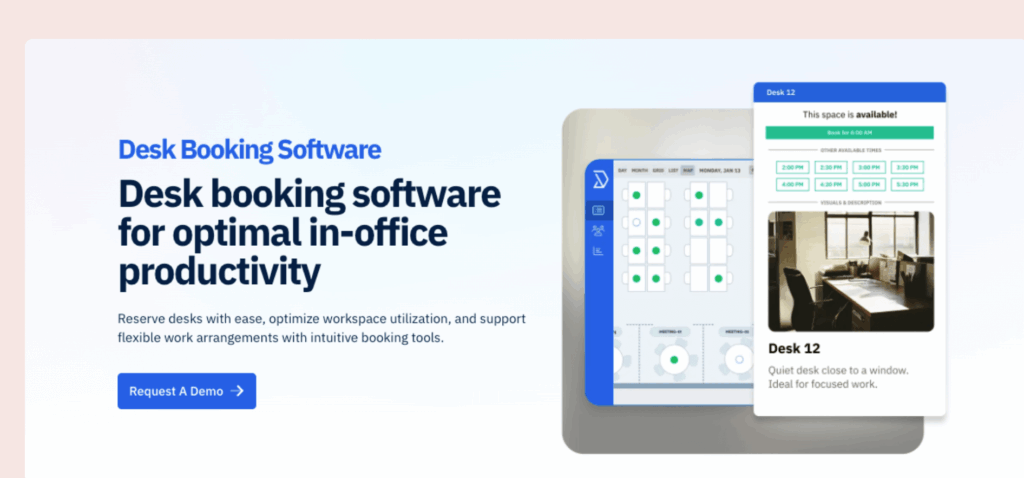
🔑 Key features
- Desk booking system: Skedda offers a drag-and-drop interface for booking desks and meeting rooms, with real-time availability to avoid double bookings.
- Interactive floor plans: You can create custom, interactive maps to give your team a visual overview of your workspace.
- Custom booking rules: Use Skedda to set specific booking rules like time limits, cancellation policies, and user permissions to control how your office spaces are used.
- Neighborhoods: Group your office into designated areas so teams can sit together whenever they want to.
- Integration capabilities: Skedda integrates smoothly with popular tools like Slack, Kisi, ServiceNow, and Google Workspace, among others.
🔎 Pros & cons
➕ Ease of use: Skedda is known for its ease of use, with a simple interface that makes it easy for anyone to book and manage spaces without needing much training. This makes it a great choice for teams that want a straightforward solution without a steep learning curve.
➕ Customizable rules: One of its key strengths is the ability to set customizable booking rules. This helps ensure that spaces are used efficiently and in line with company guidelines, giving managers control over how spaces are booked and used.
➖ Per-space limits push tier upgrades: Skedda prices plans by the number of “spaces” you get. A space is any bookable item like a desk, room, locker, or parking spot. If your plan includes 20 spaces and you are already using 18 for desks and rooms, adding a few parking spots can push you over the limit and into the next tier. Growing teams and multi-site offices hit these step-ups more often than they expect, which sometimes makes them consider Skedda alternatives.
💳 Pricing
Pricing starts at $99/month for a basic feature set, priced per space (15 spaces included). A free trial is available.
#8 Deskbird
Deskbird is a straightforward desk and meeting room booking platform that focuses on ease of use. It’s perfect for companies that want a simple, no-frills solution for reserving office spaces without the complexity of more advanced systems.
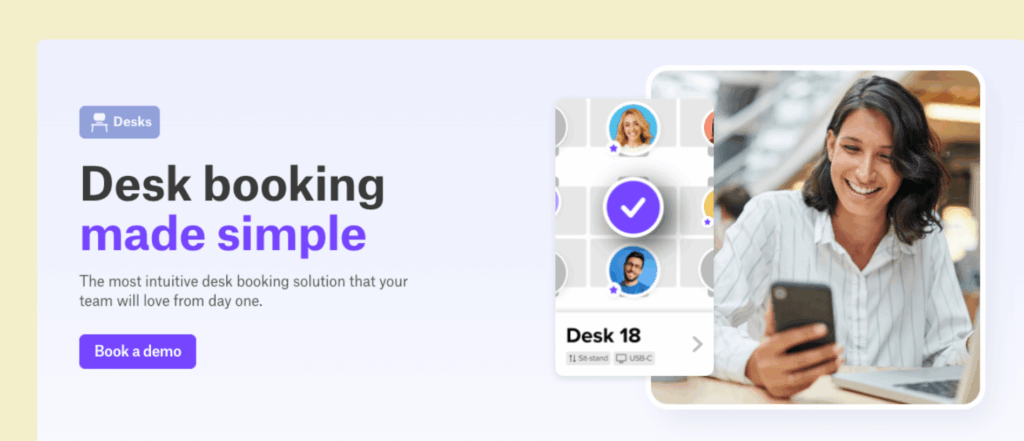
🔑 Key features
- Simple desk booking: Your employees can quickly reserve desks via the mobile app, web interface, or Microsoft Teams.
- Comprehensive resource management: Deskbird also supports booking meeting rooms, parking spots, and other resources, giving you complete control over your office assets.
- Interactive floor plans: The desk booking app provides interactive office maps, helping users quickly find available spaces and book their preferred workstations.
- Social feed: Deskbird shows when colleagues plan to be in the office, making it easier for your employees to coordinate team schedules.
- Mobile access: The mobile hot desk app allows your team to book desks (and rooms) on the go.
🔎 Pros & cons
➕ User-friendly interface: Deskbird is easy to adopt and use, thanks to its user-friendly interface. The platform requires minimal training, making it a great option for teams that need a simple, no-fuss solution.
➕ Straightforward desk and room booking: Its main strength lies in its straightforward desk and room booking features, which are offered at a low price. This makes it a good choice for businesses that only need the basics and don’t require any additional features or complexity.
➖ Limited features and integrations: Deskbird focuses solely on desk and room bookings, with a simpler feature set. It’s suitable if you need a basic system without complex integrations.
💳 Pricing
Starts at around $3.75 per user per month for the Business plan. There is a free Starter plan for up to 15 users and one office.
#9 Kadence
Kadence is an easy-to-use booking tool that helps teams reserve desks and meeting rooms, making it more straightforward for hybrid teams to manage their work in the office. It has practical features for managing space, which boosts productivity and cuts down on real estate expenses. Users like how straightforward the interface is and appreciate the quality of customer support provided by Kadence.
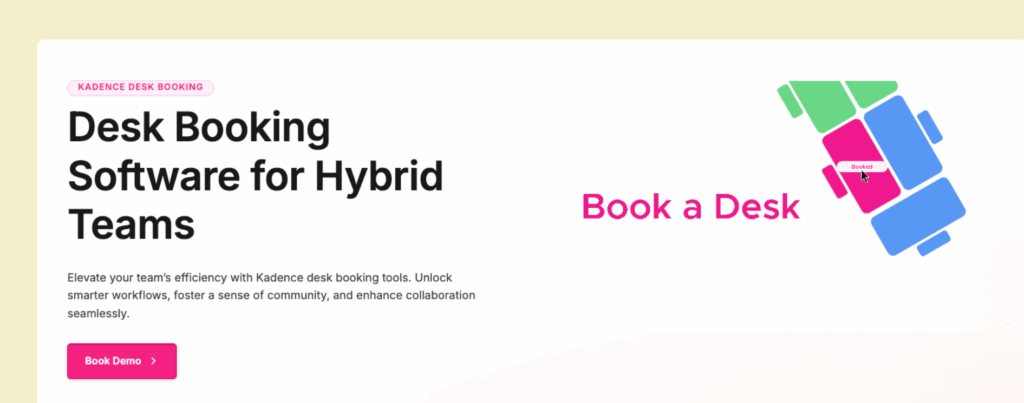
🔑 Key features
- Intelligent desk management: Your team can quickly reserve desks to have a dedicated workspace when needed.
- Interactive floor plans: Kadence lets you visualize your workspace with color-coded maps indicating popular areas.
- Kadence AI: Your employees can easily book multiple desks and manage their reservations with smart suggestions and relevant alerts when teammates change their plans.
- Smart notifications: Kadence sends notifications when teammates cancel bookings or when preferred desks are available.
- Mobile desk booking app: Your team members can book desks on the go, whether in the office or working remotely.
🔎 Pros & cons
➕ User-friendly interface: Kadence is known for its user-friendly interface, focusing on simplicity to make it easy for employees to book desks and other resources with minimal training.
➕ Helpful and responsive support: Another positive feature is its helpful and responsive support team. Many users haved praised the attentive support they’ve received, and the implementation process is generally smooth.
➖ Fewer user reviews: Kadence has fewer up-to-date public reviews, so it is tougher to judge how it performs over time. On top of that, the company moved away from its clear per-active-user pricing and now uses quote-based plans, so you need to contact their sales team to get accurate pricing.
💳 Pricing
Kadence no longer lists public pricing and instead offers custom quotes. Earlier plans were priced from around $4 per active user per month and bundled in visitor management. To know what you’d pay today, reach out to their sales team.
#10 Eden
Eden gives you a full range of tools to manage the office. It makes it easier to bring on new employees with the ticketing software, allows workers to do a wellness check, book a desk, and check in without touching anything before they even get to the office.
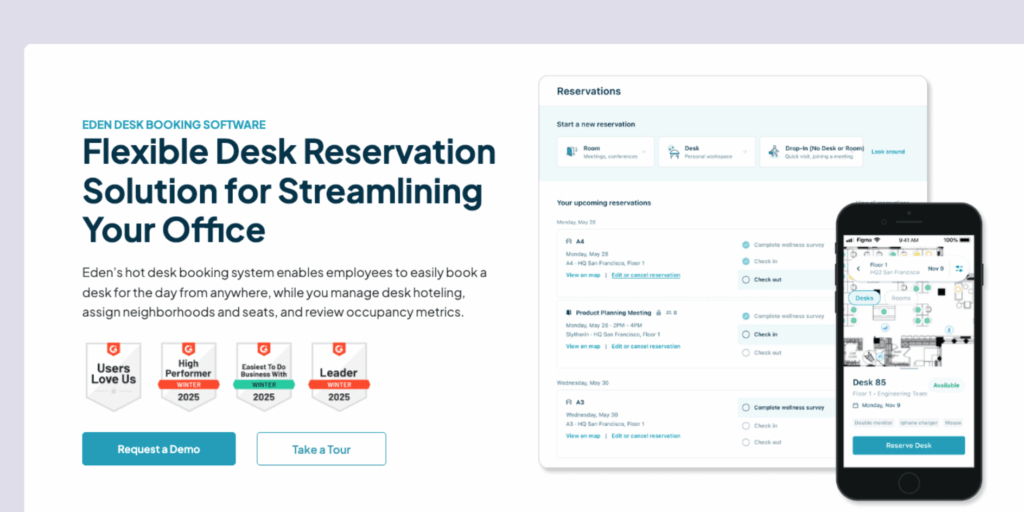
🔑 Key features
- Desk booking: Eden’s hot desk reservation system lets your employees easily reserve a desk for the day from anywhere. It also helps you manage desk hoteling, assign specific areas and seats, and track occupancy rates.
- Room scheduling: Your team can reserve conference rooms, check in and out of meetings, and sync everything with Google Calendar and Slack.
- Visitor management: Eden offers tools to efficiently track and manage visitors, ensuring a smooth and professional experience.
- Internal ticketing: The platform includes built-in tools for submitting service requests, whether it’s for IT support, maintenance, or other needs.
- Third-party integrations: Among other tools, Eden integrates with Slack, Microsoft Teams, Google Calendar, and supports SSO and directory syncing to keep your hybrid office organized and efficient.
🔎 Pros & cons
➕ All-in-one platform: Eden is an all-in-one platform that offers a comprehensive solution for managing modern workplaces. It covers everything from desk booking to facilities management, making it a great choice for organizations looking for a complete system to streamline their operations.
➕ Scalable pricing: One of the advantages of Eden is its scalable pricing. With multiple pricing tiers, it’s flexible enough to meet the needs of businesses of all sizes, whether you’re a small startup or a larger enterprise.
➖ Limited customization: However, one downside is that Eden offers limited customization. While the platform is versatile and can handle a variety of tasks, some users may find it lacking when it comes to deeper customization options for more specific workflows.
💳 Pricing
The desk booking plan starts at $2.25 per desk per month when billed annually and is sold in sets of 25 desks. Room scheduling is charged separately ($15 per room per month).
#11 Tactic
Tactic makes booking desks and meeting rooms easy for hybrid teams, whether they’re working from home or in the office. It connects smoothly with popular tools like Slack and Microsoft Teams, and its user-friendly design makes it a great option for businesses adjusting to hybrid work setups.
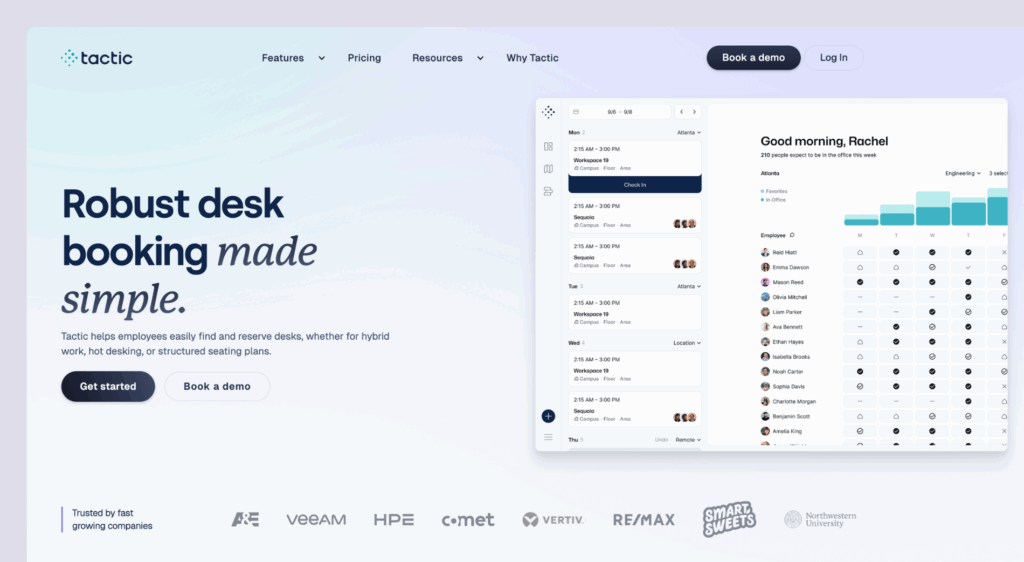
🔑 Key features
- Desk booking: Tactic allows your employees to easily reserve desks, which is especially useful for hot desking setups.
- Desk zones: You can organize hot desks by floors or designated areas to allocate desks for different departments or teams.
- Seating assignments:Assign specific desks to employees, either permanently or temporarily, to accommodate individual needs or preferences.
- Future booking limit: Control how far desks can be booked in advance to ensure fair access for all your employees.
- Meeting room reservations: Let your employees effortlessly book meeting rooms to ensure teams have the spaces they need for collaboration without scheduling conflicts.
🔎 Pros & cons
➕ User-friendly interface: Tactic is known for its user-friendly interface, which makes it easy for employees to book desks and meeting rooms without any issues.
➕ Flexible space management: One of the strengths of Tactic is its flexible space management features. It includes smart tools like automated desk assignments and the ability to set custom booking rules, which makes it adaptable to various workplace setups and helps meet the unique needs of different teams.
➖ Technical issues: However, there are some technical issues that users have reported. While the design is generally intuitive, some have experienced difficulties when trying to log into the app, particularly the first time they use it. This can be a frustrating experience for new users trying to get started.
💳 Pricing
Tactic doesn’t list fixed prices. Most customers see quotes starting around $5,000 per year, depending on workspace size, modules, and integration needs.
51 desk sharing tools listed
Still looking for desk sharing tools? This list will give you a complete overview of the desk booking options for your team:
- Archie: Best desk booking software that combines desk and meeting room booking, visitor management, and workspace analytics.
- Envoy: Desk booking, visitor management, health and safety compliance, and workplace insights in one place.
- Robin: Focuses on desk and meeting room scheduling, with tools for managing office resources and analyzing space utilization.
- elia: A flexible, scalable, and easy-to-use platform that makes desk booking and space management straightforward.
- OfficeSpace: Comprehensive space management, including hot desk booking, room scheduling, and real-time analytics.
- Officely: Slack/Teams-integrated tool for desk management and hybrid work coordination.
- Skedda: Features interactive floor plans, online booking, and customizable booking rules.
- Deskbird: Simplifies desk and room reservations, focusing on user experience and mobile accessibility.
- Kadence: Provides desk and room booking, team coordination, and AI-assisted space management features.
- Eden: Combines hot desk booking software with visitor management, internal ticketing, and office safety features.
- Tactic: Hybrid workplace management with desk and room booking, team coordination, and office insights.
- HubStar Connect (previously Smartway2): Intelligent room & desk scheduling software with analytics and integration capabilities.
- UnSpot: All-in-one hybrid office desk reservation system with space analytics.
- Clearooms: A user-friendly hot desk management software suitable for flexible workspaces.
- Tribeloo: Facilitates collaboration in hybrid workplaces with hot desking software solutions.
- Othership: Optimizes office desk reservation and collaboration through a desk booking platform for hybrid teams.
- Hybo: Workspace and desk reservation software for hybrid work models.
- Matrix Booking: Hot desk software with mobile and web apps and interactive floor plans.
- YAROOMS: Comprehensive desk and room booking, digital signage, and visitor management.
- FMS:Workplace: Combines hybrid work software and hardware solutions for integrated scheduling and workspace optimization.
- WorkInSync: SaaS platform for hybrid workplaces with desk booking and meeting room management.
- Nibol: Connects hybrid workspaces with desk and meeting room booking and coworking space reservations.
- Wisp — Gensler’s Space Management System: Space management with desk reservations, wayfinding, move management, and analytics.
- Quantum AI Workspace Manager: Optimises workspace use, including desk allocation and reservations.
- Whatspot: Easy-to-use booking system for desks, rooms, and parking.
- Proxyclick: Focused on visitor management with desk booking capabilities.
- SwipedOn: Mobile-friendly desk booking for hybrid workspaces.
- Eptura: Comprehensive desk booking and space management with robust analytics.
- OfficeRnD: Tailored for coworking spaces with desk booking and member management tools.
- Condeco: Desk booking system by Eptura.
- Zynq: Hybrid work scheduling with desk and room booking for better collaboration.
- AgilQuest: Solutions for desk booking, meeting room reservations, and usage analytics.
- Meetio: Specializes in room booking and desk management with calendar integrations.
- GoBright: Full-featured desk, room, and visitor management with workspace efficiency tools.
- MyDesk: Simple desk booking solution for managing hybrid schedules.
- Zapfloor: Tools for desk booking, contract management, and billing for coworking spaces.
- Nexudus: Coworking space management with desk booking, community engagement, and billing.
- Spacewell: Office space optimization with desk booking and IoT integration.
- Spaceti: Workplace digitalization with desk booking, occupancy monitoring, and navigation.
- Dibsido: Hot desk app and office management tools.
- Deskfound: A hassle-free desk booking solution available via Slack.
- Flydesk: Hybrid workplace management software.
- Ronspot: A desk booking system for the hybrid workplace.
- Cloudbooking: A flexible desk booking system for hybrid workplaces.
- Hybridhero: HR & workplace management software.
- Poppulo: A mobile workplace app with desk booking features.
- Joan: A comprehensive workplace management system for managing desks, rooms, assets, and visitors.
- Mapiq: A workplace experience platform to manage office spaces.
- Tidaro: A workplace management system that helps to manage hybrid work setup via desk booking.
- PULT: An all-in-one software for the modern workplace.
- Desk.ly: A desk booking system that integrates seamlessly into existing office tools.
- Seatti: Desk management software built for hybrid teams.
- Floor Plan Mapper: Interactive seating plans with hot desk booking capabilities.
Now, for the fun part — choosing your desk management software.
How to choose the right desk hoteling software
1. Understand your requirements
- Broad functionality: As you can already tell, many platforms go beyond simple desk booking, offering additional features like meeting room scheduling, visitor management, and analytics for space usage. For example, solutions like Archie and OfficeSpace provide a comprehensive set of tools to help manage every aspect of your workspace efficiently.
- Module flexibility: Make sure the platform you choose allows you to select specific modules according to your needs. Some platforms come with bundled packages, while others let you pick only the features you need, ensuring you only pay for what you use.
2. Take user experience into account
- Smooth user journey: The software must be easy to use to encourage employee adoption. Tools like Archie and Robin are known for providing a smooth and reliable experience.
- Support and training: Pay attention to how responsive and helpful customer support teams are. Check if the shared desk software provider offers training resources and quality support, like Archie or Kadence do.
- Integration flexibility: Look for platforms that integrate seamlessly with your existing tools. Think calendars, HR systems, and team communication platforms like Slack or Microsoft Teams.
- User reviews: Check honest user reviews to get insights into the desk booking software’s usability, reliability, and efficiency. When in doubt, look at popular review sites like G2 and Capterra.
3. Check pricing plans thoroughly
- Per user vs. resource: Pricing structures vary widely across desk booking software. Many traditional platforms charge based on the number of users, which can become costly as your team grows. In contrast, newer solutions like Archie adopt a per-resource pricing model. For example, if your organization has 100 employees using 50 desks, you only pay for the desks.
- Transparent costs: Transparency in pricing is essential when budgeting for software. Some platforms may include implementation fees or mandatory add-ons. Platforms like OfficeSpace charge for implementation, while others offer a lower entry price. However, a lower starting price doesn’t always mean better value. It’s crucial to assess what features and support you’re getting.
- Customizable pricing plans: Only some organizations need all the features from the start. Many desk sharing tools offer flexible packages, allowing you to choose the tools that match your current needs. This means you’re not overpaying for features you don’t need yet but can easily scale up as your business grows.
As your business grows, so will your requirements. Desk hoteling software that charges per resource is designed with scalability in mind, offering customizable features that adapt to the evolving needs of growing hybrid teams.
Do your research and make sure you understand your organization’s current needs and what you might need in the future. This way, you can choose a solution that offers good value for money and will grow with your business.
And once you’re at it, you might want to give Archie a try.

Berenika Teter
Archie's Content Manager, fueled by filter coffee and a love for remote work. When she’s not writing about coworking spaces and hybrid workplaces, you can probably find her exploring one.
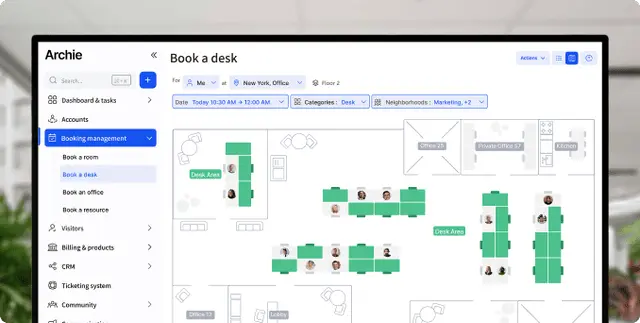
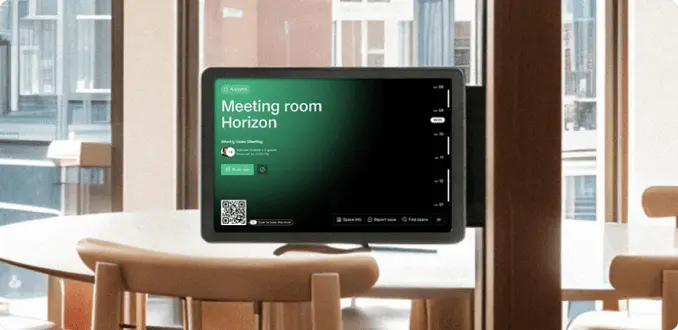
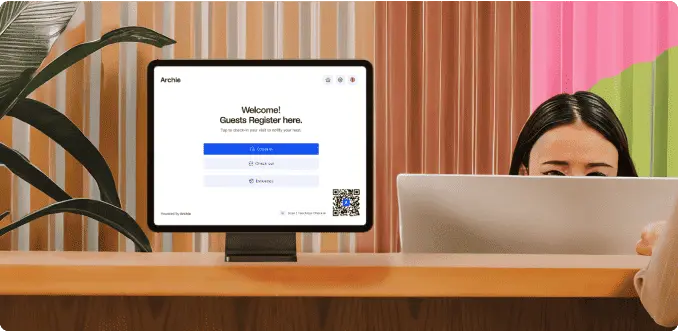
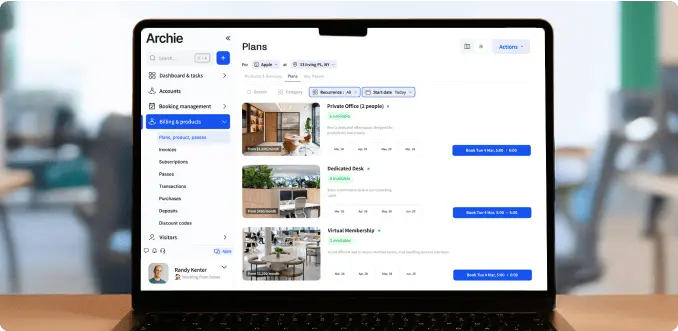
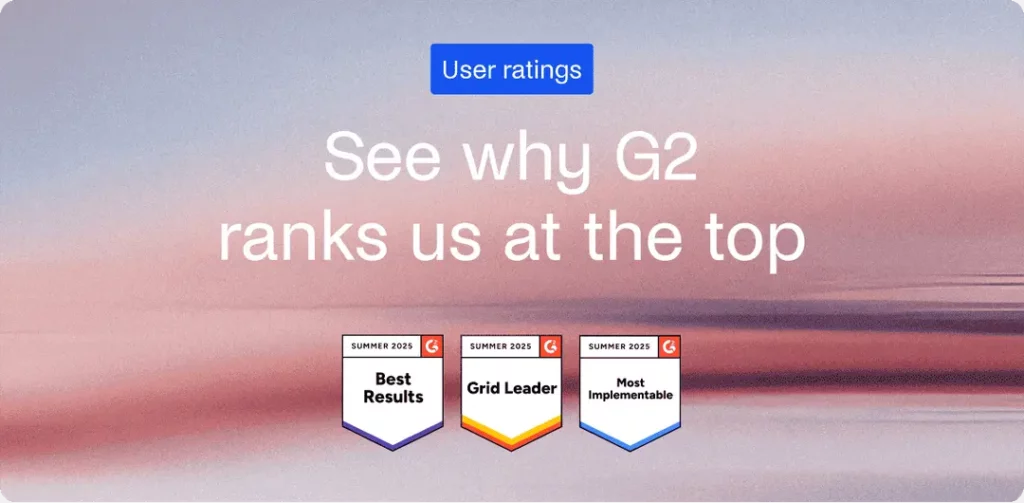
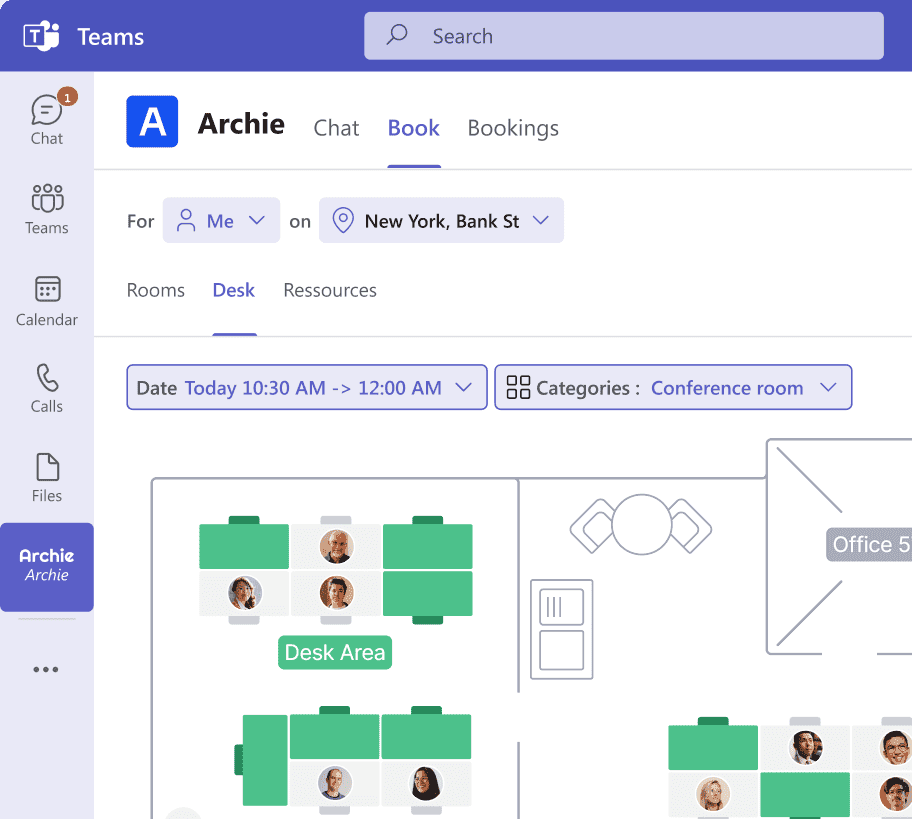
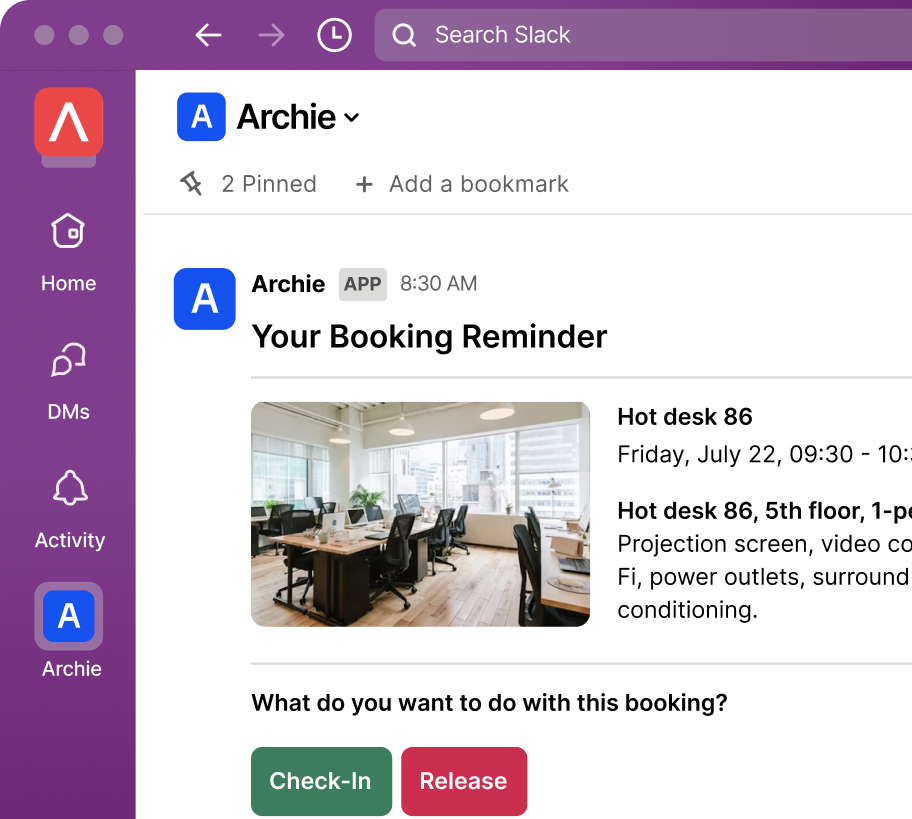
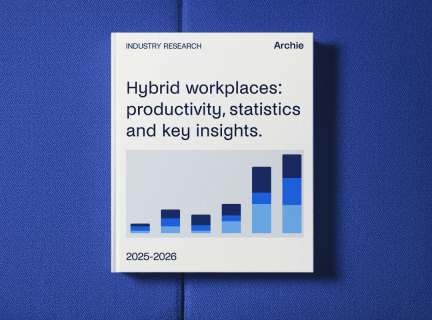
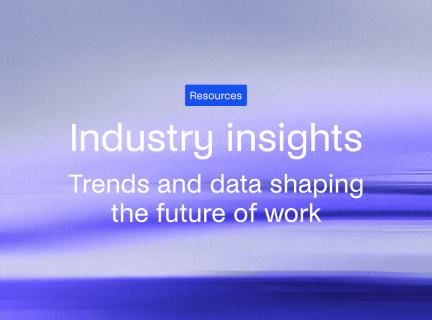
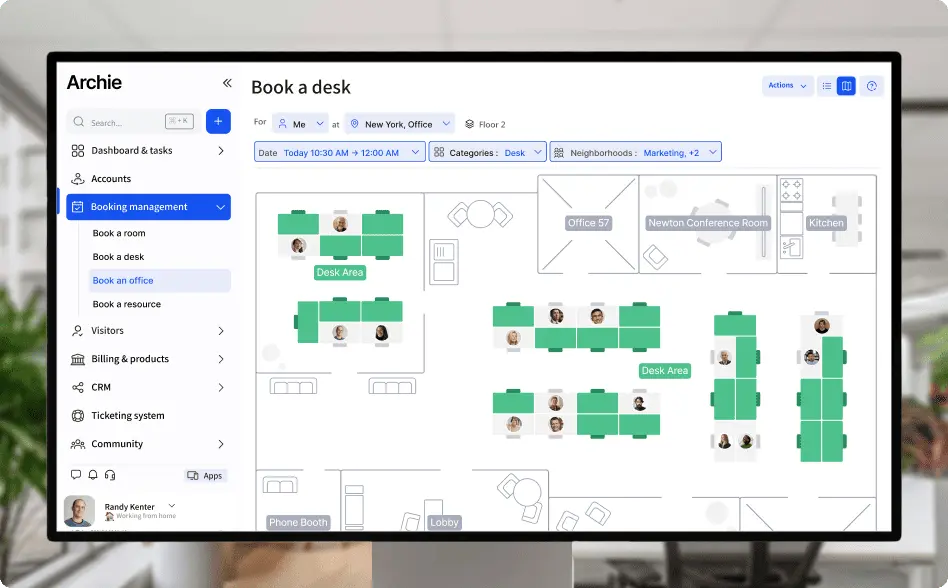
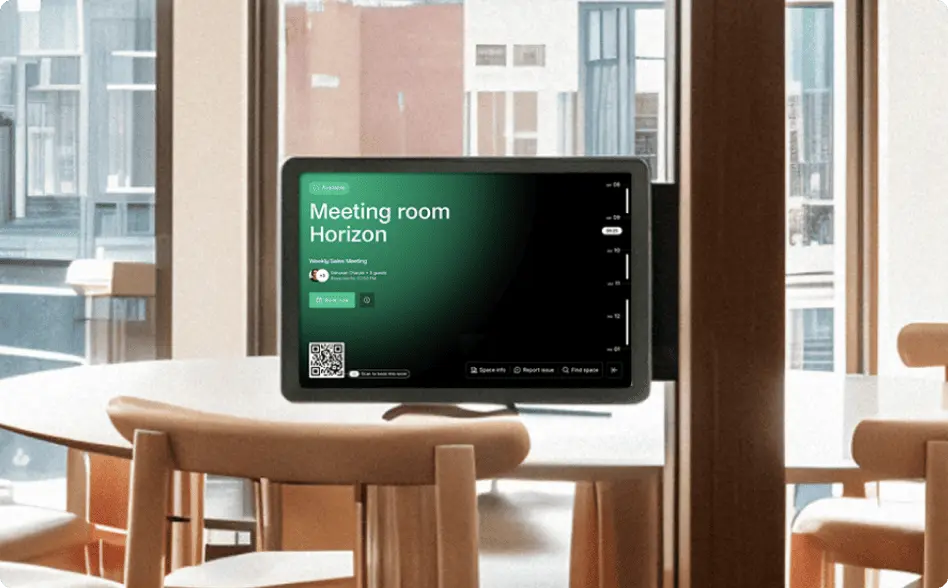
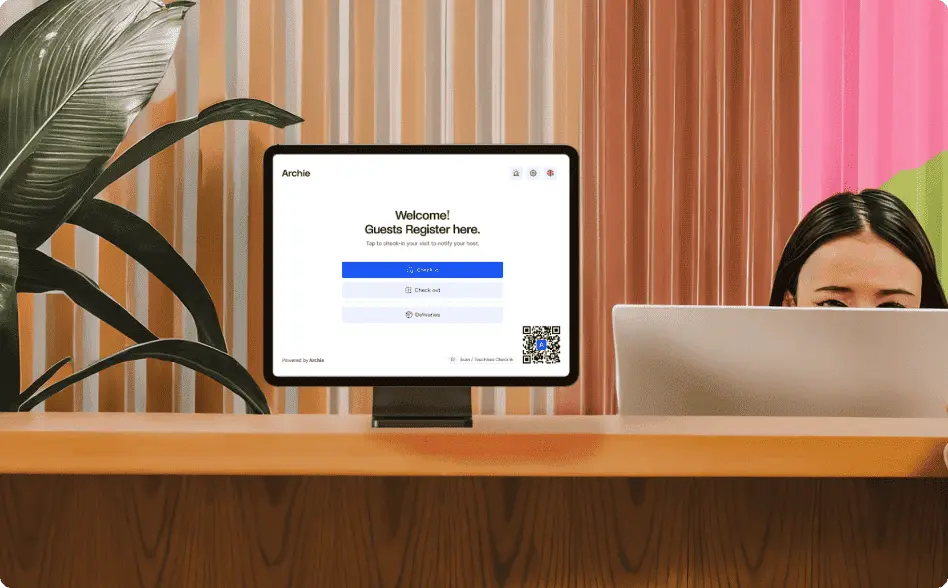
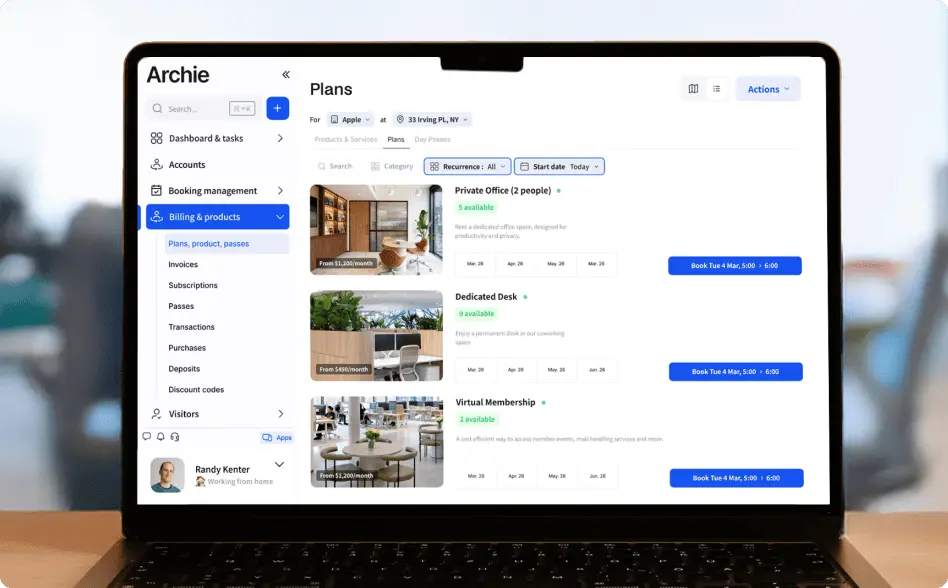

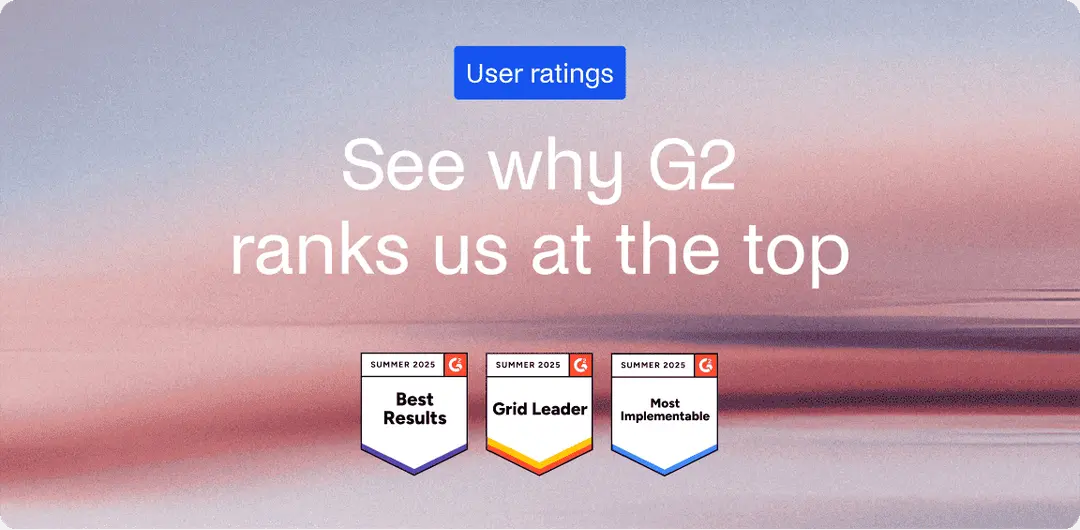
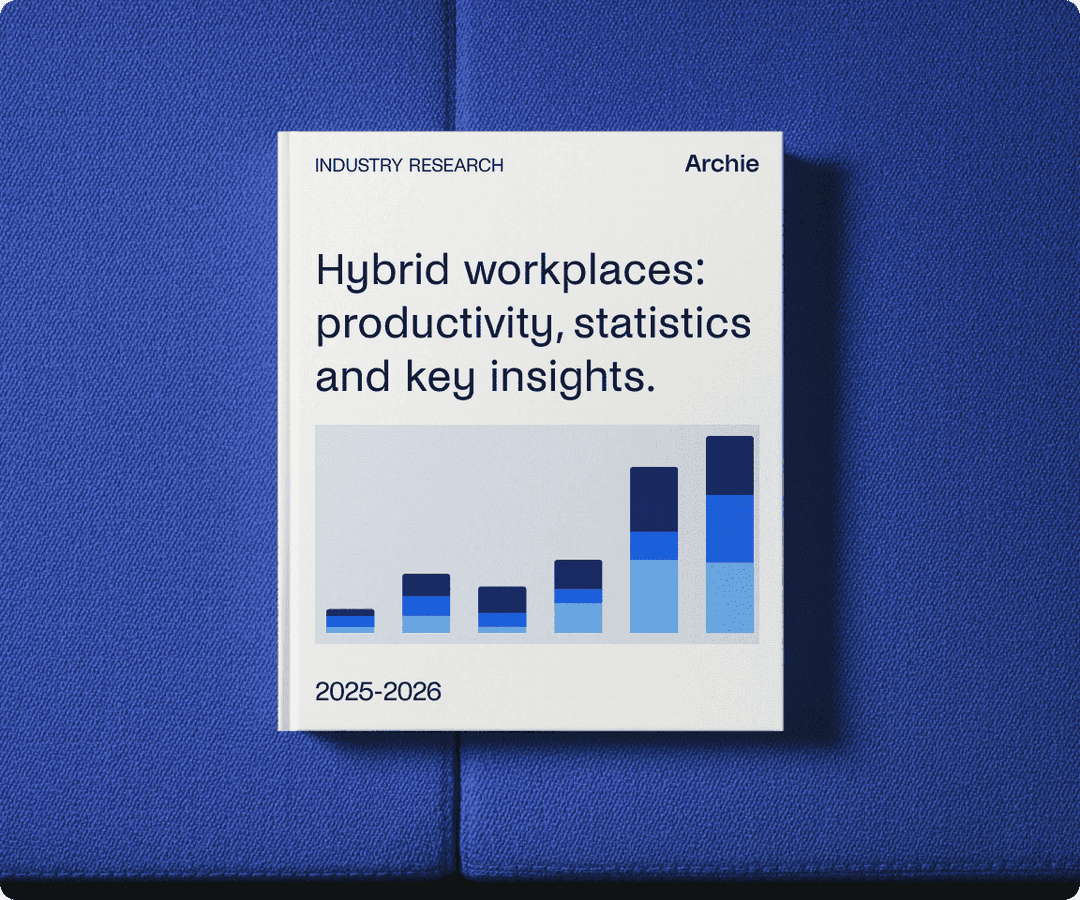

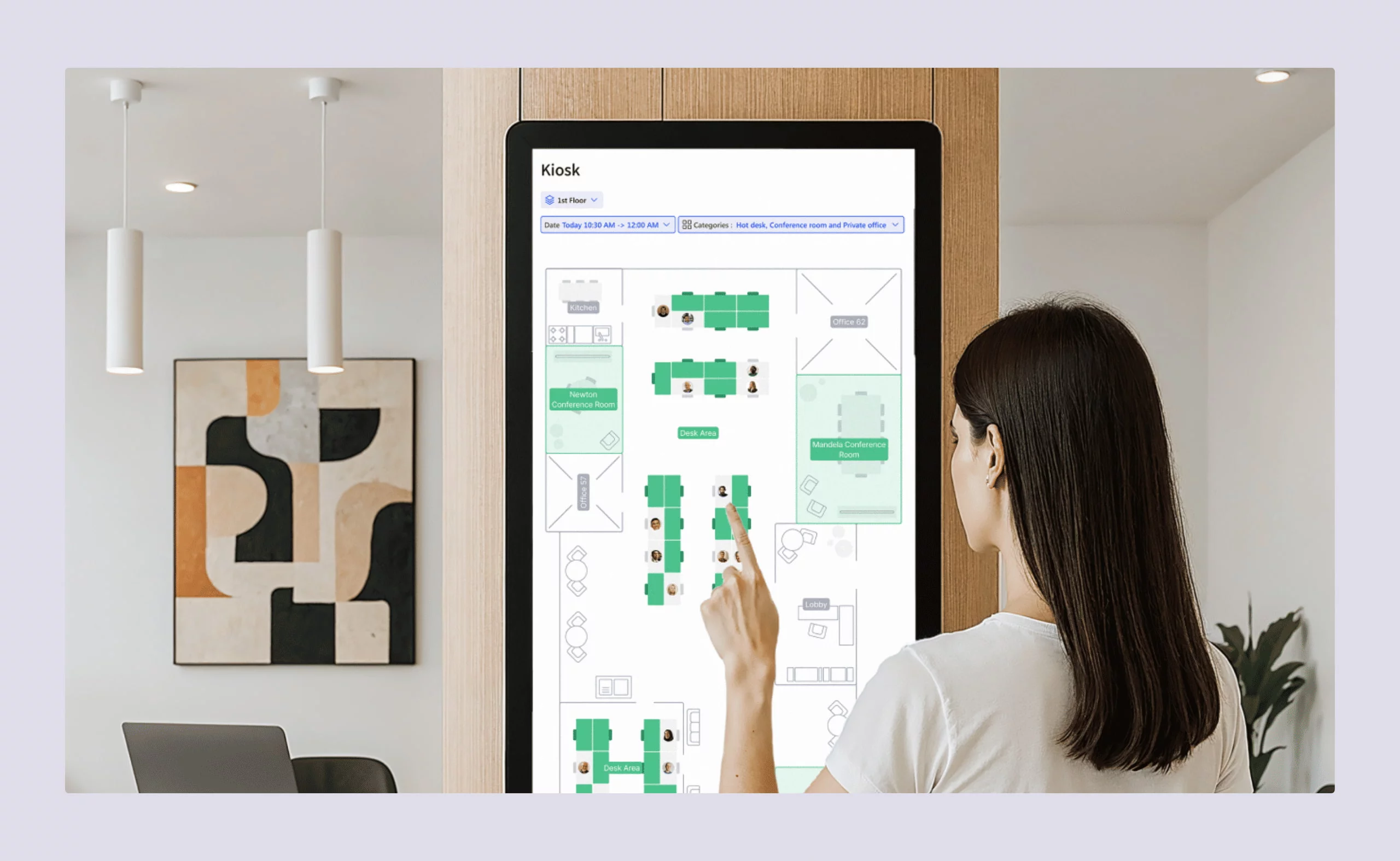
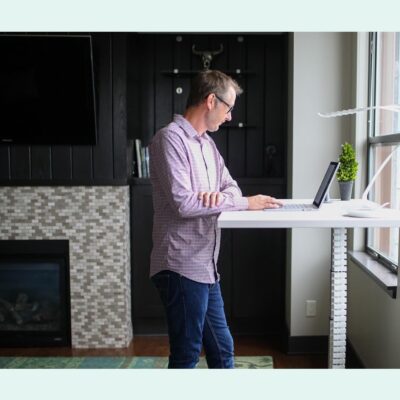
![Free Hot Desk Booking Template: Excel & Google Sheets [2026] A modern office space with people working behind hot desks.](https://archieapp.co/blog/wp-content/uploads/2024/12/Desk-booking-template-cover-image-400x400.jpg)

